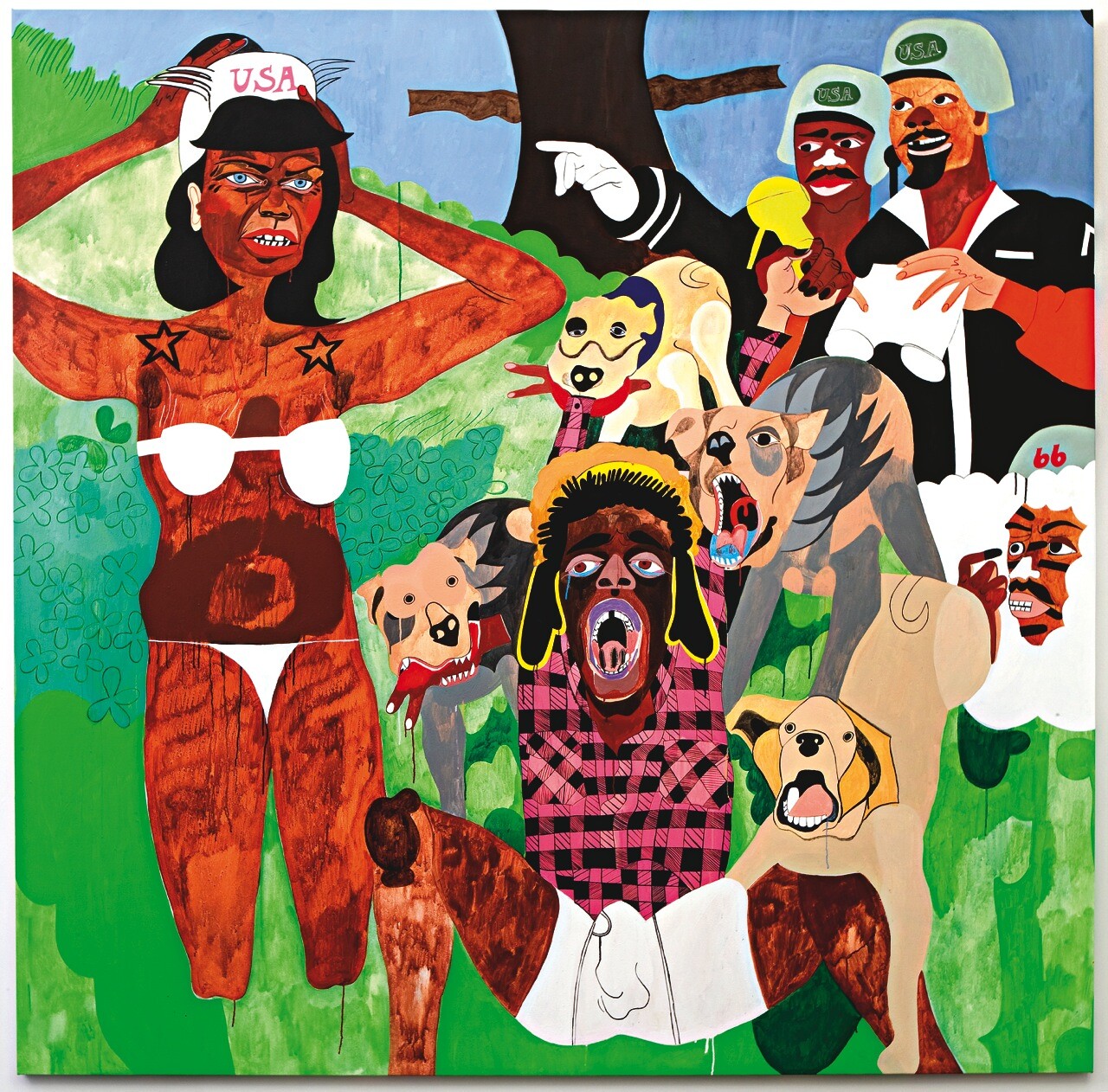Royal Flush reveals the artist’s deft hand: issues of gender, race, inequity, and homophobia tackled with wit, accessibility
February 27–June 30, 2019
735 Anderson Hill Road
Purchase, NY 10577
USA
Hours: Wednesday–Sunday 12–5pm
T +1 914 251 6100
nma@purchase.edu
Royal Flush reveals the artist’s deft hand: issues of gender, race, inequity, and homophobia tackled with wit, accessibility
Nina Chanel Abney is one of the most important young artists on the rise today. Born in Chicago in 1982, Abney tackles controversy—homophobia, race, politics, consumerism, and inequity—in a manner she describes as “easy to swallow, hard to digest.” Her provocative yet spirited narratives on the social dynamics of urban life explode in her bold, flat, colorful paintings and collages, that are packed with symbols, numbers, words, emojis, figures and body parts. They are all informed by celebrity culture, video games, social media, hip-hop, tabloid news, and a 24-hour news cycle.
Beginning on February 27, the Neuberger Museum of Art at Purchase College, SUNY, in Purchase, New York will present Abney’s first solo museum exhibition, Nina Chanel Abney: Royal Flush, which was organized in 2017 by the Nasher Museum of Art at Duke University. The show will include approximately 30 of the artist’s paintings and collages, which were made over the last decade. Now on national tour, the Neuberger will be its last stop. Royal Flush will remain on view through June 30, 2019. The show also traveled to the Chicago Cultural Center, and the Institute of Contemporary Art and California African American Museum in Los Angeles during 2018.
Royal Flush: Nina Chanel Abney is accompanied by a full-color catalogue with essays by exhibition curator Marshall N. Price, Nancy Hanks Curator of Modern and Contemporary Art at the Nasher Museum; Jamillah James, Curator, the Institute of Contemporary Art, Los Angeles; Natalie Y. Moore, Chicago Public Media, WBEZ; and Richard J. Powell, John Spencer Bassett Professor of Art and Art History at Duke University. Nina Chanel Abney: Royal Flush is supported in part by an award from the National Endowment for the Arts along with generous support from the Friends of the Neuberger Museum of Art and the Purchase College Foundation.
According to Price, the title of the exhibition is taken from a player’s most valuable hand in poker, but it is something of a double entendre. “It refers to Abney’s work, which contains iconography reminiscent of playing cards and the four different suits,” Price says. “But the title also suggests that the artist holds a valuable hand. When Abney ‘lays her cards on the table,’ she presents paintings that are rich in critical commentary and meaningful metaphor.”
The subject matter may be serious and even raw, but Abney tries to keep it accessible. “Early on, I wanted to raise a bunch of questions but find a way to keep a sense of humor, a lightheartedness, even if it was kind of deceptive.” She describes her methodology as intuitive. “Improvisation is a big part of my process because I am usually responding to something. I never sketch [beforehand] but gather bright paint, a bunch of different colors, and I go from there.”
The artist’s iconography is a marriage of colorful geometric abstract elements; her figures include mask-like faces with exaggerated or missing features, and a blending or reversal of genders and ethnicities. Her characters might be violent villains, unwitting victims, aspirational heroes or ineffectual anti-heroes. “In portraits, I mix gender and race so one can’t attach one specific meaning to a painting or figure,” Abney says. Yet race does come into play. Not wanting to be defined by a single political motivation, she says she bears the burden forced on black artists: “If I paint a black figure, it can’t just be a figure. It has to be about blackness or race or whatever, where white artists don’t have to think about those things.”
Abney’s technique has strong ties to her modernist forebears Stuart Davis, Romare Bearden, and Faith Ringgold, but pulls also from public art and mural painting. Her use of bright colors, basic shapes, geometric blocks, and patterning call to mind Picasso and Matisse. “I want to raise a bunch of questions. I want my work to be relevant to what’s happening now.”


